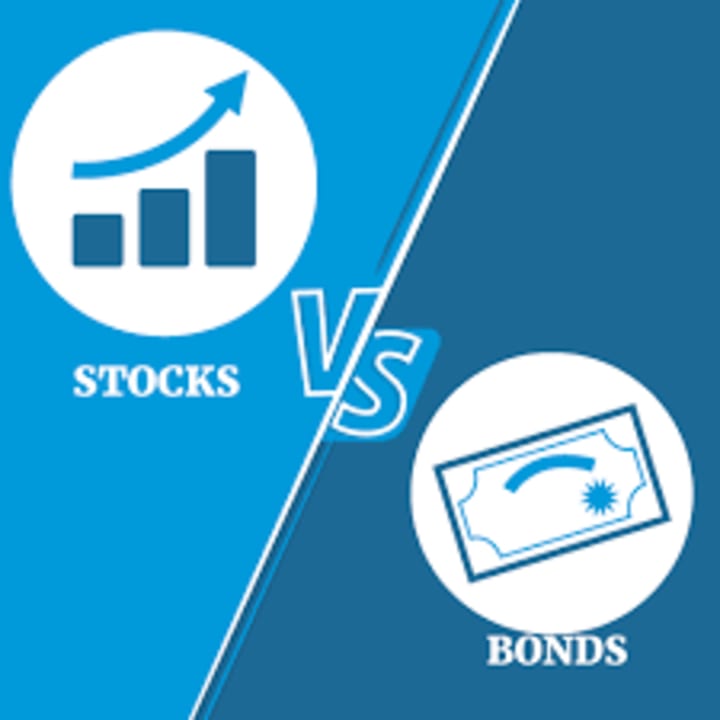What Is The Stock market Share price Finance
What is the stock market and how does it work?

What is the stock market and how does it work?

The stock market is a collection of exchanges where stocks and other securities are bought and sold. In simple terms, it is a marketplace where publicly traded companies' shares are listed and traded. It works by matching buyers and sellers of securities through a stock exchange or over-the-counter market.
The price of the security is determined by supply and demand. When more people want to buy a particular stock, the price goes up, and when more people want to sell it, the price goes down. The stock market has a significant influence on the economy and can be an indicator of economic health.
What are shares and how do they differ from stocks or bonds?
Shares refer to ownership of a corporation. When a company wants to raise money, it sells ownership stakes to investors, who then become shareholders. Shares are represented by stocks. For example, if a company issues one million stocks and you own 10,000 of them, you own 1% of the company.

Stocks and shares are often used interchangeably to refer to the ownership of a company. Bonds, on the other hand, are debt securities that represent a loan made by an investor to a corporation or government. Instead of owning a small piece of the company, bondholders essentially lend money to the entity that issued the bond with the promise of receiving interest payments and the principal amount of the bond at maturity.
Stocks and bonds differ in terms of risk and return. Stocks are generally more volatile, meaning their value can fluctuate enormously, while bonds tend to provide a more stable but lower return on investment. Investors can earn money from stocks through capital appreciation (the stock price increasing) and dividends (payments made by the company to shareholders). With bonds, interest is paid to bondholders on a regular basis.
What factors affect share prices?
There are several factors that can affect share prices, some of which include:
1. Company performance: A company's financial performance, profits, and revenue can have a significant impact on its share price. Positive news such as earnings increases or revenue growth can drive up share prices, while negative news such as losses or a decline in revenue can lead to a drop in stock prices.
2. Economic conditions: The state of the economy can impact share prices. Factors such as inflation, interest rates, and GDP growth can influence investor sentiment and therefore stock markets.

3. Political and geopolitical events: Changes in government policies, elections, or international tensions can trigger market volatility and impact investor confidence.
4. Industry trends: Changes or advancements in an industry's technologies, products, or services can impact share prices of companies operating in that industry.
5. Market sentiment: Investor confidence can greatly impact stock prices, with optimistic market sentiments resulting in increased demand for shares and vice versa.
6. Supply and demand: The law of supply and demand plays a significant role in determining share prices. If a company has a limited supply of shares, and there is high demand for them, the share price is likely to increase and vice versa.
7. Company news: Any news or announcements that are made by the company, such as mergers and acquisitions, management changes, or new product launches, can influence the share price in the short term.
How are share prices determined?
Share prices are determined through the law of supply and demand. When there are more buyers looking to purchase stocks than sellers looking to sell, the share price will rise. Conversely, when there are more sellers than buyers, the share price will fall. Generally, share prices are set on public stock exchanges, where buyers and sellers come together to trade shares.

Here, an ongoing auction system is utilised to determine the price of the stock. The highest bidder willing to pay the asking price of the seller will purchase the stock, and the transaction will be finalised. The prices of shares can also be impacted by other factors such as company news, fundamental financial factors, trends in the economy or industry, and political or geopolitical events. Nonetheless, the law of supply and demand is the primary determinant of share prices on a day-to-day basis.
What is the difference between bull and bear markets?
Bull and bear markets are used to describe the trends in the stock market or any other investment market.
A bull market is a period of time when the stock market is rising steadily and investments are generally profitable. In a bull market, investor confidence is high, and there is often a lot of activity in the stock market. Typically, there are more buyers than sellers, and share prices tend to increase.

A bear market, on the other hand, is a period of time when things are declining, and investor confidence is low. In a bear market, there is generally a lot of selling activity and fewer buyers. This type of market is usually associated with declining prices, and investors tend to become more cautious.
The main difference between bull and bear markets, therefore, is that bulls represent a rising and optimistic market, while bears signify a downward trend in the market. Both types of markets may have different impacts on different investments and investors, thus it is important to stay informed on market trends and to understand your risk tolerance as an investor.
What are the risks and benefits of investing in the stock market?
Investing in the stock market can provide investors with an opportunity to grow their wealth, but it also presents risks. Some potential benefits of investing in the stock market include:
1. Potential for high returns: Historically, investors who have held stocks for long periods have been rewarded with relatively high returns compared to other types of investments.
2. Ability to diversify your portfolio: The stock market offers a wide range of investment options, allowing investors to diversify their portfolio across different asset classes, companies, sectors, and countries. This can help reduce the overall risk of the portfolio.

3. Liquidity: Stocks can be easily bought and sold on the stock market, providing investors with quick access to their funds.
However, there are also risks that investors need to be aware of, including:
1. Volatility: The stock market can be highly volatile, with prices fluctuating wildly over short periods of time, which can cause significant losses.
2. Market recessions/crashes: Historical events have shown that market recessions and crashes can occur and lead to significant drops in the overall value of investments.
3. Limited control: As an individual investor, you have limited control over the management and direction of the companies you invest in.
4. Political/economic instability: Economic or political instability can affect the stock market and cause significant losses to investors.
It is important to understand these risks and potential benefits and to develop a solid investment strategy that aligns with your risk tolerance and financial goals.
How can one get started in the stock market?
Getting started in the stock market can seem daunting at first, but with the right approach, anyone can become an investor. Here are some steps to consider:
1. Educate yourself: Before you start investing, it is important to learn about the stock market, how it works, and the different investment options available to you. You can read books, attend seminars, take online courses, and speak with financial advisors to educate yourself.
2. Choose your investment strategy: Mainly two types of investment strategies are there, long-term and short-term investing. Decide what your investing goals and investment horizon are. Based on this, develop a sound investment strategy.
3. Set a budget: Determine your investment budget and be realistic about how much money you can invest.
4. Open a brokerage account: You will need a brokerage account to buy and sell stocks and other investments which can be opened with online or in-person financial brokers.
5. Start investing: Once you have your account set up, start investing in stocks or other securities that align with your investment strategy and goals.
6. Monitor your investments: Keep track of your investments regularly, making sure they remain aligned with your goals. If necessary, make adjustments to your portfolio.
It is also important to have a long-term perspective and remain patient, as investing in the stock market involves risks and can take time to provide significant returns. It's always advisable to consult with a financial expert before making any investment decision.
About the Creator
Enjoyed the story? Support the Creator.
Subscribe for free to receive all their stories in your feed. You could also pledge your support or give them a one-off tip, letting them know you appreciate their work.






Comments
There are no comments for this story
Be the first to respond and start the conversation.